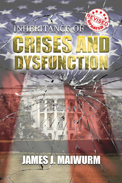
 |
Staunton Pepper, better known as Salt, has recently retired from a law career which sometimes mixed with government business. Losing his wife to Covid, Salt has returned to his family farm and is taking time to grieve and decide what to do with the rest of his life. However, the new president and his staff enlist Salt in a far-reaching and possibly far-fetched plan to try to repair the United States’ reputation globally. After the authoritarian last president made a mess of America’s reputation, Salt is sent to Europe to find out where the U.S. really sits with its partners and what can be done to improve the current reputation of the nation. Soon, Salt finds himself dodging possible Russian agents, working on an Iran deal, and caught between two capable and attractive women. This is much different than the quiet farm life Salt thought he saw in his future, and he still hasn’t even unpacked.
Maiwurm’s political fiction is a roadmap for centrists in the post-Trump era. Wrapped in a diplomatic thriller, the novel offers a view of inroads for American diplomacy attempting to rebuild trust and respect. However, the book is much less dire than works such as 1984 or Lord of The Flies. Instead, Maiwurm sees a hopeful outcome and offers his ideas on how a more positive outcome can be reached for American diplomacy through a series of bridge-building offers, including repairing broken treaties and more holistic approaches to sanctions and foreign relations. Maiwurm points out how punitive some of the country's foreign policy decisions are on the average American trying to make ends meet at home. He also makes a case for resigning treaties broken by the U.S. and an international policy that is both considerate of domestic issues and cooperative with partner nations. The narrative works under the assumption that most Americans are centrist, whether sitting on the left or right, and that a lot can be done by focusing on where thinking overlaps rather than where it diverges.
Maiwurm’s writing is clear, grammatically consistent, and easy to read. His protagonist is likable enough and is meant to represent an average American, not too far on either side of the political spectrum. Maiwurm uses a few pages out of a spy thriller, such as the heroes being followed, an assassination attempt, and high-stakes political wrangling, to keep the thriller plot engaging readers as he delivers his political solutions. Most of the time, it works. However, the protagonist and thriller plot tend to get lost at times when the main character gives voice to the political thoughts and plans behind the narrative. The political views are clearly the driving force behind this book. Still, in an age where most political novels are simply thinly veiled attacks on whatever party stands opposite the author, it is refreshing to read a book with a more hopeful and healing vision of America’s political future. This outlook, along with a decent bit of espionage, will make this a pleasing read for genre fans.